Einavd-l
On this page, you find all documents, package deals, and flashcards offered by seller einavd-l.
- 11
- 0
- 2
Community
- Followers
- Following
13 items
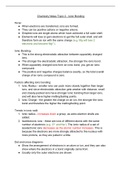
Edexcel Chemistry A Level Unit 2 - Bonding and Structure (All Topics)
Set of revision notes for all topics of Unit 2, including; Ionic Bonding, Covalent Bonding, Metallic Bonding, Electronegativity and Polarisation, Intermolecular Forces, Solubility and Making Predictions.
- Package deal
- • 7 items •
- Unit 2 Topic 7 - Making Predictions • Summary
- Unit 2 Topic 6 - Solubility • Summary
- Unit 2 Topic 5 - Intermolecular Forces • Summary
- Unit 2 Topic 4 - Electronegativity and Polarisation • Summary
- Unit 2 Topic 3 - Metallic Bonding • Summary
- And more ….
Set of revision notes for all topics of Unit 2, including; Ionic Bonding, Covalent Bonding, Metallic Bonding, Electronegativity and Polarisation, Intermolecular Forces, Solubility and Making Predictions.

Unit 2 Topic 1 - Ionic Bonding
Study notes for Unit 2 Topic 1 - Ionic Bonding for Chemistry Edexcel A Level 2015. Focusing on what ionic bonding is, how this type of bonding is formed and why, the various factors affecting ionic bonding and the trends in ionic radii, and physical properties of ionic compounds.
- Package deal
- Summary
- • 2 pages •
Study notes for Unit 2 Topic 1 - Ionic Bonding for Chemistry Edexcel A Level 2015. Focusing on what ionic bonding is, how this type of bonding is formed and why, the various factors affecting ionic bonding and the trends in ionic radii, and physical properties of ionic compounds.
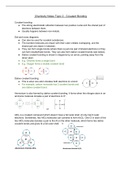
Unit 2 Topic 2 - Covalent Bonding
Study notes for Unit 2 Topic 2 - Covalent Bonding for Chemistry Edexcel A Level 2015. Focusing on what covalent bonding is, how this type of bonding is formed and why, dot-and-cross diagrams, dative covalent bonding, the properties of covalent structures. Also summarises bond length/strength, molecular shape and bond angles of covalent substances, and giant covalent lattices.
- Package deal
- Summary
- • 4 pages •
Study notes for Unit 2 Topic 2 - Covalent Bonding for Chemistry Edexcel A Level 2015. Focusing on what covalent bonding is, how this type of bonding is formed and why, dot-and-cross diagrams, dative covalent bonding, the properties of covalent structures. Also summarises bond length/strength, molecular shape and bond angles of covalent substances, and giant covalent lattices.
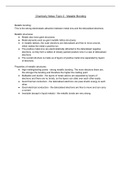
Unit 2 Topic 3 - Metallic Bonding
Study notes for Unit 2 Topic 3 - Metallic Bonding for Chemistry Edexcel A Level 2015. Focusing on what metallic bonding is, how this type of bonding is formed and why, and the properties of metallic structures.
- Package deal
- Summary
- • 1 pages •
Study notes for Unit 2 Topic 3 - Metallic Bonding for Chemistry Edexcel A Level 2015. Focusing on what metallic bonding is, how this type of bonding is formed and why, and the properties of metallic structures.
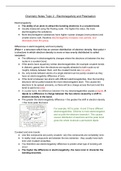
Unit 2 Topic 4 - Electronegativity and Polarisation
Study notes for Unit 2 Topic 4 - Electronegativity and Polarisation for Chemistry Edexcel A Level 2015. Focusing on electronegativity and its trends, polar vs non-polar molecules, how dipoles arise, and what makes a compound covalent or ionic.
- Package deal
- Summary
- • 2 pages •
Study notes for Unit 2 Topic 4 - Electronegativity and Polarisation for Chemistry Edexcel A Level 2015. Focusing on electronegativity and its trends, polar vs non-polar molecules, how dipoles arise, and what makes a compound covalent or ionic.
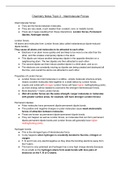
Unit 2 Topic 5 - Intermolecular Forces
Study notes for Unit 2 Topic 5 - Intermolecular Forces for Chemistry Edexcel A Level 2015. Focusing on the three different types of intermolecular forces, London forces, permanent dipoles and hydrogen bonds, as well as the properties of each one with specific examples referring to ice/water, alkanes, alcohols and hydrogen halides.
- Package deal
- Summary
- • 3 pages •
Study notes for Unit 2 Topic 5 - Intermolecular Forces for Chemistry Edexcel A Level 2015. Focusing on the three different types of intermolecular forces, London forces, permanent dipoles and hydrogen bonds, as well as the properties of each one with specific examples referring to ice/water, alkanes, alcohols and hydrogen halides.
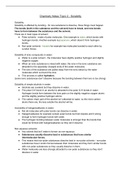
Unit 2 Topic 6 - Solubility
Study notes for Unit 2 Topic 6 - Solubility for Chemistry Edexcel A Level 2015. Focusing on solubility, the bonding which affects it, the two main types of solvent and the solubility of certain organic compounds in different solvents.
- Package deal
- Summary
- • 1 pages •
Study notes for Unit 2 Topic 6 - Solubility for Chemistry Edexcel A Level 2015. Focusing on solubility, the bonding which affects it, the two main types of solvent and the solubility of certain organic compounds in different solvents.
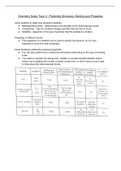
Unit 2 Topic 7 - Making Predictions
Study notes for Unit 2 Topic 7 - Making Predictions for Chemistry Edexcel A Level 2015. Focusing on making predictions on physical properties using various different factors such as particles and bonding.
- Package deal
- Summary
- • 1 pages •
Study notes for Unit 2 Topic 7 - Making Predictions for Chemistry Edexcel A Level 2015. Focusing on making predictions on physical properties using various different factors such as particles and bonding.
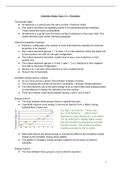
Edexcel Chemistry A Level Unit 1 - The Atom and the Periodic Table (All Topics)
Set of revision notes for all topics of Unit 1, including; The Atom, Ionisation Energy, Electronic Configuration and Periodicity.
- Package deal
- • 4 items •
- Unit 1 Topic 1 - The Atom • Summary
- Unit 1 Topic 2 - Ionisation Energy • Summary
- Unit 1 Topic 3 - Electronic Configuration • Summary
- Unit 1 Topic 4 - Periodicity • Summary
Set of revision notes for all topics of Unit 1, including; The Atom, Ionisation Energy, Electronic Configuration and Periodicity.

Unit 1 Topic 4 - Periodicity
Study notes for Unit 1 Topic 4 - Periodicity for Chemistry Edexcel A Level 2015. Focusing on the periodic table and how it is organised, as well as chemical properties of groups, ionisation energies across periods, melting/boiling points and the irregularities between groups 2/3 and 5/6.
- Package deal
- Summary
- • 2 pages •
Study notes for Unit 1 Topic 4 - Periodicity for Chemistry Edexcel A Level 2015. Focusing on the periodic table and how it is organised, as well as chemical properties of groups, ionisation energies across periods, melting/boiling points and the irregularities between groups 2/3 and 5/6.
